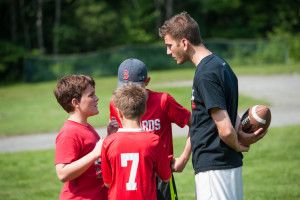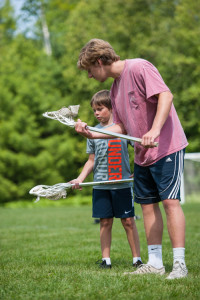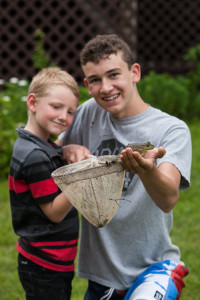 At Kingswood, we feel the youngest campers, boys 7-10 (and some 11) years old, have specific needs which set them apart from the older campers. While the concept of choice — each activity block offers a menu of options — remains the cornerstone of our program for boys of all ages, the following items receive special emphasis among the youngest campers:
At Kingswood, we feel the youngest campers, boys 7-10 (and some 11) years old, have specific needs which set them apart from the older campers. While the concept of choice — each activity block offers a menu of options — remains the cornerstone of our program for boys of all ages, the following items receive special emphasis among the youngest campers:
A 1:3 counselor to camper ratio is maintained in the sleeping cabins. Great care is taken to select counselors who are temperamentally suited to working with the youngest boys.
The locations of the junior camper sleeping cabins are guided by such considerations as proximity to the bathroom buildings, the directors’ cottages, and the infirmary.
Boys are given both guidance and assistance in cleaning up the cabin each morning before the activity periods begin.
 Before each block of activities commences (e.g., morning block at 9:30-12:30) counselors review the upcoming schedule individually with each camper. Special patrols are assigned to the cabin areas and other significant locations to assure that “little guys”, especially, get pointed in the right direction.
Before each block of activities commences (e.g., morning block at 9:30-12:30) counselors review the upcoming schedule individually with each camper. Special patrols are assigned to the cabin areas and other significant locations to assure that “little guys”, especially, get pointed in the right direction.
All instructional clinics are geared to the skill levels of the participants. Given that attention spans vary widely from youngest to oldest, the amount of “in-focus” time varies, too. For example, junior campers attending a swim instruction clinic may be given an occasional “free swim” break while seniors attempting to learn to windsurf may remain tuned to the lesson for the entire period.
 Low-key activities such as frisbee lacrosse, team hide and go seek and fishing often complement the more traditional teamsport choices during the afternoon and evening blocks. Lesser regimentation provides the youngest boys ample doses of easy social interaction.
Low-key activities such as frisbee lacrosse, team hide and go seek and fishing often complement the more traditional teamsport choices during the afternoon and evening blocks. Lesser regimentation provides the youngest boys ample doses of easy social interaction.
Each evening before bedtime, the on-duty cabin counselor (one for each cabin) supervises the boys’ visit to the bath house and thereafter settles them down with a nighttime story or other quiet group activity. The director, assistant director or nurse visits the junior cabins most evenings simply to provide official assurances that all is well.
During the first three nights of each session, one counselor remains inside the cabin at all times. Thereafter, once lights are out, a patrol is stationed outside the cabin within close range until off-duty counselors return to the cabins to go to bed.
The main problem areas for the youngest boys are related to homesickness, hygiene and group dynamics. The cabin counselors, directors and nurses are sensitive to these concerns.
Communication between the camp and parents is of paramount importance. A call from one of us at camp is not cause for a panic attack, for it most likely means we’ve witnessed behavior necessitating both your knowledge and input.
